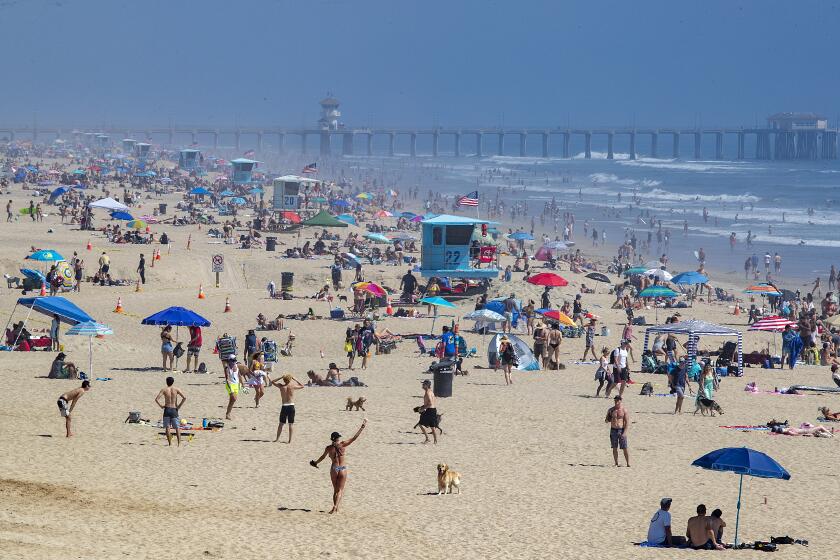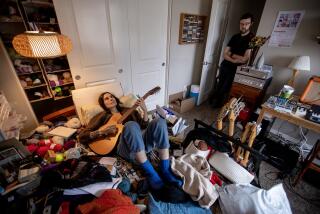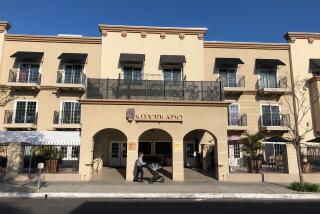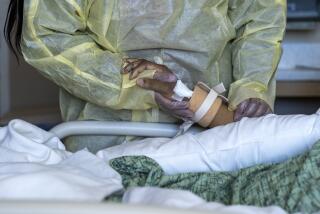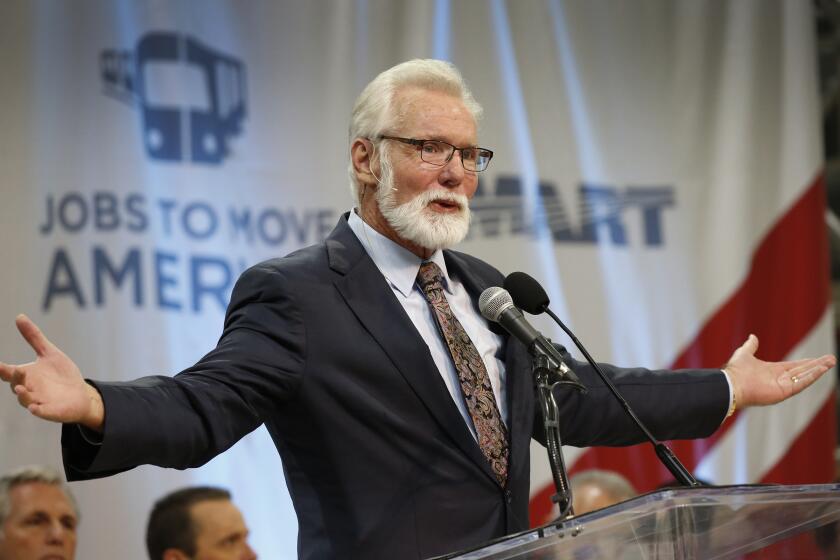A nurse died from COVID-19. Her family says elite L.A. care home ordered her to admit a sick man
- Share via
When Brittany Bruner-Ringo, a nurse at an upscale dementia care center on Los Angeles’ Westside, phoned her mother in Oklahoma in mid-March, she was uncharacteristically rattled and looking for advice.
Her supervisors at Silverado Beverly Place had instructed her to admit a new resident, a retired doctor flown in from New York City, despite the fact that the facility was under lockdown to prevent the sort of COVID-19 outbreaks that were cropping up in the man’s hometown.
Bruner-Ringo told her mother, a veteran nurse in Oklahoma City, that the doctor was showing signs of illness — profuse sweating, a “productive” cough and a fever close to 103 degrees, her mother said in an interview.
“I said, ‘Those are definitely problematic,’” Kim Bruner-Ringo recalled.
Within a day of his arrival, the doctor was so ill that Bruner-Ringo called 911 for an ambulance. It appears to have been too late. The man had COVID-19, and in the days and weeks that followed, at least 63 residents and employees came down with the virus. Nine have died.
One who succumbed was Bruner-Ringo. The 32-year-old nurse stopped breathing April 20 in the intensive care unit at Harbor-UCLA Medical Center. Her family said that before she was placed on a ventilator, she talked about going public with what happened at the Silverado as soon as she recovered.
“I was just praying every day that Brittany would be able to tell her own story,” said her sister Breanna Hurd.
The 125-bed Silverado Beverly Place has come in for heavy criticism since acknowledging an outbreak there in late March. The residence is part of a chain of high-end memory care centers that can cost families more than $15,000 a month for luxury touches, such as gourmet food and live performances, and cutting-edge dementia treatment.
Residents’ families have accused management of greed for signing up a new customer at a time when family visits had been canceled and nonessential employees barred.
Silverado’s Irvine-based parent company has consistently defended the decision to admit the new resident as reasonable and compassionate. Representatives, including the company’s chief executive, have insisted the man had a pressing need for care.
They’ve said he showed no signs of the virus March 19 when he entered the building in the Beverly Grove neighborhood, and this week they produced redacted medical records in which Bruner-Ringo appears to describe him in good health upon admission.
Her surviving family members say she told them a much different story — that the man arrived ill, that she told her supervisors he should be removed and that they ignored her suggestion.
What is not in dispute is that Bruner-Ringo was exceptionally dedicated to her patients and that she died too young.
“We are absolutely heartbroken,” said Jeff Frum, a Silverado spokesman.
The news comes after a memo saying California’s governor would go further, closing all state and local beaches and parks, a plan he appeared to abandon.
Nursing was Bruner-Ringo’s passion and to some extent, her inheritance. In addition to her mother, her grandmother, who helped raise her, was a nurse. The profession suited her personality — upbeat, empathetic and eager to help. She worked in Cleveland before coming to Southern California.
She got a part-time job at the Silverado before moving to a full-time position in November. The facility had three floors of dementia patients with the top, where she often was assigned, housing the most mild cases. Employees were encouraged to form close relationships with the residents, and Bruner-Ringo took to the approach. One co-worker recalled her speaking up at meetings with supervisors about patients who needed more attention and affection.
“She was just kind-hearted. I don’t think she really thought of it as a job,” said Hurd, an Oklahoma social worker, adding that the sisters texted “24-7” and often FaceTimed each other for hours on end. “She never complained about her job, even once, as much as we talked.”
Like nursing homes and senior residences across the country, Silverado started locking down in response to the coronavirus outbreak in early March. By Bruner-Ringo’s birthday, March 17, the rest of the city had followed suit and there weren’t many options to celebrate.
“I’m not going to lie, this whole thing really sucks but I’m going to try to make the best of it and just be thankful that I am alive and healthy,” she wrote on Instagram next to a photo of her decked out for St. Patrick’s Day in sparkly jade eye shadow and a headband with jiggling shamrocks.
Two days later, she was told to expect a new resident on the third floor. It was news that baffled many staffers. Why would they allow an outsider during a pandemic, Kim Bruner-Ringo recalled asking Brittany during one call.
“She told me she thought it was his status, and I said, ‘Well, what status does he have?’ And she said, ‘He’s a prominent physician,’” her mother said.
Employees and residents’ relatives identified the doctor as a 69-year-old surgeon who recently lived on Manhattan’s Upper East Side. His children, one who lives in London and the other in L.A., did not return messages seeking comment. The man recovered from the virus and now lives on the floor where Bruner-Ringo worked.
The doctor, accompanied by one of his children, flew from New York to LAX on March 19 and was driven to the facility, according to current and former employees who spoke on the condition of anonymity for fear of professional retaliation.
From the underground parking garage, the man and his relatives took the elevator directly to the third floor, where Bruner-Ringo met them. She took him to a private room and began evaluating him. Redacted medical records shared by the company indicate that about 8 o’clock that night, she recorded his temperature as 96.5.
“Resident appears well-groomed and is very pleasant and cooperative with assessment,” the record states. “No cough noted, no [symptoms] of any respiratory distress.”
Her mother and sister said she told them that the new resident arrived running a fever between 102 and 103 degrees, coughing and sweating. Her mother said she advised her daughter that the fever alone was enough to send the doctor to a hospital. Bruner-Ringo told her mother that she agreed but administrators overruled her.
“Brittany, document, document, document. Cover your butt,” she recalled telling her daughter.
When Bruner-Ringo returned for her shift the following day, the doctor’s condition had worsened. Medical records provided by the company indicate he was coughing up green phlegm, had a fever of 101.9 and was experiencing chills. He was taken by ambulance to Cedars-Sinai Medical Center.
Hours later, she texted her sister that she’d gotten word the doctor probably had COVID-19.
“I know you’re freaking lying,” her sister shot back.
“I wish I was lying,” she said, adding, “I’m so mad! He came from New York and [I’ve] come to find out his damn daughter flew from London to New York to fly him here to LA!”
Fearful of infecting others, Bruner-Ringo moved out of the Gardena home she’d been sharing and into a Torrance hotel to self-quarantine. A test confirmed that she too had the virus. In an Instagram post, she posed in front of an American flag in the hotel and explained that she had gotten “exposed at work.”
“I am hopeful and feel much better today as I am managing my symptoms fairly well,” she wrote.
In conversations with relatives, she talked about publicizing her experience once she was well.
“I feel ok for the most part honestly. About to call CNN now lol,” Bruner-Ringo joked in a March 25 text. Her sister, Hurd, agreed, texting that her story “needs to be heard. ... That whole facility needs to be shut ... down.”
“Girl I want the world to know! I am not ashamed, I don’t think this is my fault,” she wrote.
The next day, Bruner-Ringo was growing weaker and more fatigued.
“When I was walking to the bathroom earlier I lost my balance for a sec and almost fell over,” she texted her mother on March 26.
Then she lost her sense of smell and her breathing became labored. At the beginning of April, she was taken by ambulance to Harbor-UCLA and placed on a ventilator.
Back at Silverado, the scope of the virus’ spread was becoming clear. Ultimately more than three dozen residents and 27 staffers would test positive. Residents started dying. Part of the second floor was turned into a COVID-19 unit. Some caregivers cried as they worked. Some quit in fear. Families of some of the dead began consulting attorneys.
While Bruner-Ringo started her second week on a ventilator, an industry group chaired by a Silverado executive appealed for government protection against criminal prosecution and some types of civil suits stemming from the pandemic. The California Assisted Living Assn. joined other healthcare groups in an April 9 letter urging Gov. Gavin Newsom to sign an executive order indemnifying facilities. The governor is still weighing the move.
Kim Bruner-Ringo drove to L.A. to be with her daughter, but wasn’t allowed into the hospital.
Tell her that I am here and I am ready to bring her home to Oklahoma as soon as she is off the ventilator, she asked the nurses. Her sisters called every day to get the staff to relay messages of encouragement and love.
The nurses would later tell the family that she was their strongest COVID-19 patient. While others in the ICU were unconscious, Bruner-Ringo was awake, smiling at staff, following their instructions and writing notes.
Business groups, nonprofits, healthcare associations and some legislators are criticizing some moves the California governor made in response to coronavirus outbreak.
Silverado executives reached out to her mother for updates, and she told them that the prognosis seemed good. She was young and healthy, the doctors said, a perfect candidate to beat the virus.
“Until that last day, they said her labs and vitals looked good,” she said.
She was still on the ventilator when she died. After all the days of sitting in a hotel, thinking and praying about her daughter in the hospital, Kim Bruner-Ringo finally got to go there. She wasn’t allowed in the room with her daughter’s body, but she was allowed to view it through a window. It was like the way newborns are displayed in a hospital nursery, she thought.
She knew her daughter had died doing what she loved, helping people, but it was hard to ignore the bleakness of her end.
“My daughter died alone,” she said.
Before she left for Oklahoma, Kim Bruner-Ringo went to Silverado’s Irvine office to sign papers related to her daughter’s workers’ compensation and life insurance. In a conference room, company officials expressed their condolences and then one executive stated that the new resident who had infected her daughter had not displayed any symptoms when he was admitted.
“I didn’t say another word,” Kim Bruner-Ringo said. “I just listened because that is what they are standing on, and I knew different. It was not the truth.”
As soon as this meeting is over, I can get out of California, she told herself. On her way out, someone handed her an envelope. When she opened it later at her hotel, she found a condolence note signed by Silverado employees and two $500 gift cards.
The company said the cards were meant to defray some of her travel costs.
While some families of Silverado residents who died are preparing to file lawsuits, Bruner-Ringo’s mother said she has no plans to take anyone to court. Her focus is on the funeral, which will take place in Oklahoma on Saturday, and on learning to live without her.
“What do you do if the person who you talk to every day is no longer there?” Hurd asked.
More to Read
Sign up for Essential California
The most important California stories and recommendations in your inbox every morning.
You may occasionally receive promotional content from the Los Angeles Times.
